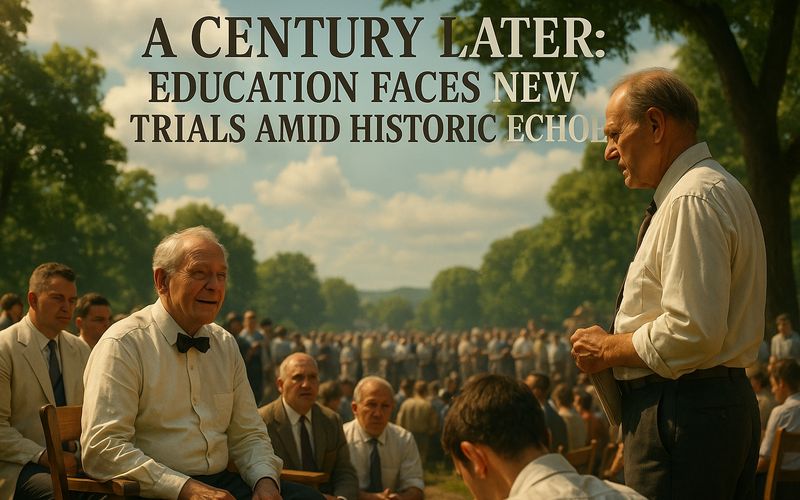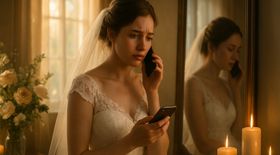Today I’m remembering what Lela Scopes told me about her famous brother for my Paducah Sun story going on 46 years ago.
She said before John Thomas Scopes left to teach science and coach football at Rhea County High School in Dayton, Tenn., in 1924, he explained: “I’m going there because it’s a small town with a small school where I won’t get in any deep water.”
The skinny, bespectacled, freckle-faced 24-year-old from Paducah ended up the defendant in one of history’s most sensationalized courtroom battles.
A century ago this month, Scopes was convicted of violating the Butler Act, a Volunteer State law that forbade the teaching of evolution in public schools. His punishment was a $100 fine.
But the “Monkey Trial” grabbed newspaper headlines worldwide. Dozens of reporters converged on Dayton. So did tent revivalists and swarms of hucksters hawking popcorn and pink lemonade and hustling Bibles and souvenirs, including stuffed monkeys.
The State of Tennessee v John Thomas Scopes was also the first trial broadcast live on radio.
I interviewed Lela Scopes in August 1979, when I was a Sun feature writer. She also said John had worried about what their mother might think of the trial: “He was afraid it would get in the Louisville paper, Mother would read about it and think he was a hothead.”
Anyway, as Mark Twain said, “history doesn’t repeat itself, but it often rhymes,” and now is one of those rhyming times.
“Public education is once again under siege from a sustained effort by Christian Nationalists to blur the line between church and state,” warns A.J. Schumann, a youth organizing fellow with Americans United for Separation of Church and State.
Like today, the 1920s were times of “rapid social, economic and cultural change,” said David Krueger, professor emeritus of history at West Kentucky Community and Technical College in Paducah.
Scopes admitted he covered evolution when he substitute-taught for the absent biology teacher. (In their zeal to ban evolution, Tennessee lawmakers failed to remove the state-approved biology textbook, which included evolution.)
Scopes believed in evolution and agreed to stand trial on principle.
The trial, which began on July 10, 1925, and concluded on July 21, was essentially a clash of competing values: urban science and modernism versus rural, old-time Protestant fundamentalist Christianity.
“The cause defended at Dayton is a continuing one that has existed throughout man’s brief history and will continue as long as man is here,” Scopes wrote in Center of the Storm, his 1967 memoir. “It is the cause of freedom, for which man must do what he can.”
The attorneys embodied the collision of values. Tennessee summoned William Jennings Bryan of Nebraska as special prosecutor. A fundamentalist champion, he had been a Democratic congressman, secretary of state and three-time presidential candidate.
The American Civil Liberties Union hired Clarence Darrow to lead Scopes’ defense team. Darrow was widely considered the country’s top defense lawyer. He was from Chicago, believed in evolution and was an agnostic.
Bryan and Darrow dueled like gladiators in the sweltering midsummer East Tennessee heat. The courtroom became so hot that the trial was moved outdoors to the tree-shaded courthouse lawn where the crowd of spectators grew even larger.
Bryan got a conviction as expected. But progressives, including liberal Christians, believed science and reason had vanquished “EVIL-lution” in the court of public opinion. They pointed to July 20, when Darrow called Bryan to the stand as a Bible expert.
“There was no pity for the helplessness of the believer come so suddenly and so unexpectedly upon a moment when he could not reconcile statements of the Bible with generally accepted facts,” The New York Times reported. “There was no pity for his admissions of ignorance of things boys and girls learn in high school, his floundering confessions that he knew practically nothing of geology, biology, philology, little of comparative religion, and little even of ancient history.”
In Only Yesterday, his 1931 chronicle of the 1920s, Frederick Lewis Allen wrote: “Theoretically, Fundamentalism had won, for the law stood. Yet really Fundamentalism had lost. Legislators might go on passing anti-evolution laws, and in the hinterlands the pious might still keep their religion locked in a science-proof compartment of their minds; but civilized opinion everywhere had regarded the Dayton trial with amazement and amusement, and the slow drift away from Fundamentalist certainty continued.”
Allen and the progressives of his day missed the mark. Donald Trump and his Republican Party owe a big part of their electoral success to white Christian evangelicals of the “God said it. I believe it. That settles it.” persuasion.
Schumann warned that “today’s Christian Nationalist rhetoric echoes the anti-modernist anxieties of the 1920s — fear that secularism is destroying ‘traditional values’ and that public institutions should reflect a ‘Christian America.’”
He wrote that the First Amendment safeguards all Americans “from having any single belief system imposed on them by the state,” a fact that seems to be lost on much of the GOP these days.
Schumann concluded that the Scopes “trial reminds us that the separation of church and state is not something we can take for granted. It is a principle that must be actively defended, especially in moments of cultural anxiety and political division, when calls to return to some mythic past grow loudest.”
Scopes died in 1970 at age 70. He is buried in the family plot in Paducah’s Oak Grove Cemetery next to his wife, Mildred, and close to Lela, who died in 1989 at 92. “A Man of Courage” is his epitaph. A state historical marker at the cemetery’s main entrance tells about him.
Scopes said not a word during the trial. He got his chance at the end.
After the jury delivered the expected guilty verdict and the judge fined Scopes $100, one of his lawyers pointed out that the defendant had been denied the right to speak before sentencing.
“Your Honor, I feel that I have been convicted of violating an unjust statute,” Scopes said. “I will continue in the future, as I have in the past, to oppose this law in any way I can. Any other action would be in violation of my ideals of academic freedom, that is to teach the truth as guaranteed in our Constitution, of personal and religious freedom. I think the fine is unjust.”
After Scopes finished, the judge repeated the fine. The verdict was later overturned on a technicality, Schumann wrote, but the Butler Act wasn’t repealed until 1967.











